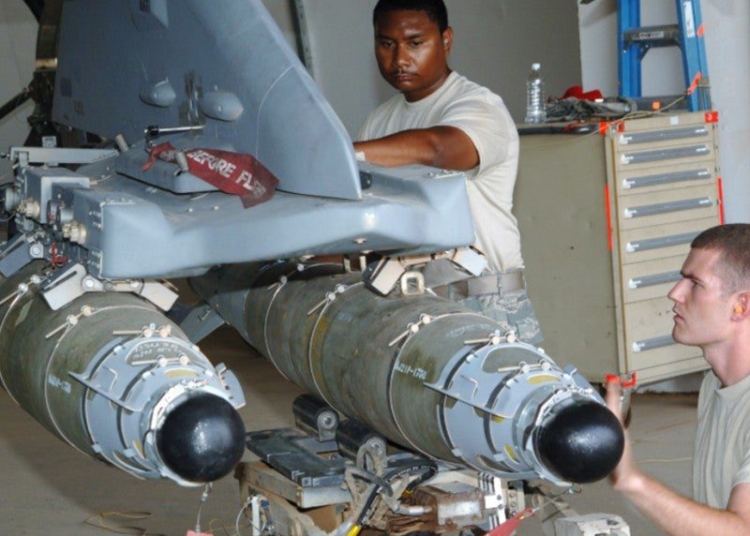Morocco, Bahrain, and Jordan will receive BRU-57/A weapon release units to double the amount of smart bombs their F-16 fighter jets can carry.
L3Harris Technologies has announced a $29 million contract to provide smart weapon release systems to air forces in the Middle East and North Africa.
The Bomb Release Unit BRU-57/A will allow F-16 fighter aircraft in the air forces of Bahrain, Jordan and Morocco to carry two smart weapons on each hardpoint instead of one, doubling munitions capacity. The unit is compatible with 500 and 1,000lb guided weapons.
‘Our release systems provide extra offensive capabilities while giving commanders the versatility to deploy the right firepower for every mission,’ said Ed Zoiss, president, Space and Airborne Systems, L3Harris.
“These combat-proven systems provide munitions overmatch and allow mission commanders to send the right weapon at the right time to the right target.”
As of today, the Royal Moroccan Air Force (RMAF) has 23 F-16C/D Block 50/52 aircraft which it received between 2011 and 2012, having lost one over Yemen during combat operations.
The Moroccan government has earmarked nearly a billion dollars for the sale of various F-16 ammunition and weapons from the United States through the Defence Security Cooperation Agency (DSCA).
The various ammunition and weapons requested includes armament for the Royal Moroccan Air Force F-16 Viper fighter jets such as 5,810 MK82-1 bombs (fitted with Tritonal explosive filling); 300 Mk 84-4 bombs (Tritonal filling); 105 Joint Direct Attack Munitions (JDAM) KMU-572F/B Tail Kits; 180 MXU-651B/B Air Foil Groups (AFG) for GBU-10 Paveway II guided bombs; 4 125 MXU-650C/B AFGs for GBU-12 Paveway II guided bombs; 4 305 MAU-169L/B Computer Control Groups (CCG) for GBU-10,-12,-16 weapons; and 5 178 FMU-152 fuzes.
Also, in 2019, the Royal Moroccan Air Force (RMAF) requested to procure more F-16s and to upgrade its existing fleet.
Adding two additional smart munitions on each F-16 mean commanders can reduce the number of aircraft on a strike mission and provide more time on station with fewer returns to base for rearming.
The indefinite-delivery, indefinite-quantity contract includes an initial lot of 105 release systems. The BRU-57/A entered service in 1999, with more than 1,100 ordered to date.
Installing the smart racks requires no additional modifications in the aircraft wiring, allowing the ground crews to install or remove the release systems anytime.
The United States Department of Defence in August 2020 awarded Lockheed Martin a contract to produce and supply Morocco with twenty-four F-16 Viper multi-role fighter jet through its foreign military sales contract.
That same year, the United States also approved a contract to upgrade 23 existing Moroccan F-16s to latest Viper configuration for $985.2 million; another contract to supply Joint Direct Attack Munitions (JDAMs) and bombs worth $209 million was also greenlighted.
To increase the capabilities of its Lockheed Martin F-16 Fighting Falcon combat aircraft in naval warfare, the Royal Moroccan Air Forces is acquiring Boeing AGM-84L Harpoon Block 2 anti-shipping missiles from the United States in a deal worth $62 million.
Morocco intends to use the missiles on its F-16 multirole fighter aircraft to enhance its capabilities in effective defense of critical sea-lanes,” according to the DSCA notice read.
Although, the Boeing AGM-84L Harpoon Block II missiles which Morocco requested to procure from the United States for its F-16s fighter jets will have reduced coastal targeting capabilities says the US.
The Harpoon missiles to be supplied to Morocco are the “non-coastal target suppression” version, which will not be able to attack land targets, this is according to an April 27 US Federal Register arms sale notification.





 العربية
العربية 简体中文
简体中文 繁體中文
繁體中文 Nederlands
Nederlands Français
Français Deutsch
Deutsch עִבְרִית
עִבְרִית Italiano
Italiano 日本語
日本語 한국어
한국어 فارسی
فارسی Português
Português Русский
Русский Español
Español Türkçe
Türkçe Українська
Українська